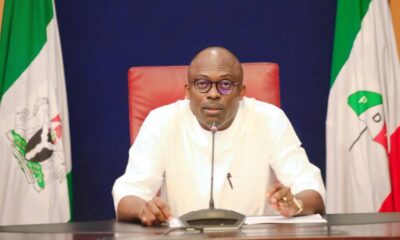Editorial
Making Neighbourhood Watch Law Work
Arguably, none of the 25 bills so far passed by the 8th Rivers State House of Assembly has generated so much controversy like the State Neighbourhood Watch Safety Corps Bill recently signed into law by Governor Nyesom Wike. In fact, since the inception of the current democratic experiment in 1999, only an infinitesimal percentage of bills went through such hurdle.
Little wonder why several state government officials including Governor Wike, the State Attorney General and Commissioner for Justice, Emmanuel Chinwe Aguma (SAN), the Minority Leader of the State legislature, Frederick Anabraba (sponsor of the bill), among others, at different fora, had explained the import and essence of the bill.
In a nutshell, the proponents of the bill affirmed in unmistakable terms that the bill which was signed into law, penultimate week, by the State governor was meant to enhance the State internal security and the much-talked about community policing.
Elucidating on the philosophy behind the bill, Hon Anabraba explained in a live radio programme that the intention of the bill is not to haunt anybody or group but to assist the security agencies for effective networking, collaboration and prevention of crimes and criminality in the 23 local government areas of the State.
While regretting the widespread misconception of the law, especially by the opposition, the lawmaker said the agency which will oversee the law would boost security, promote civilian-police relationship, cover areas of lapses by security agencies as well as harmonise the operations of vigilante groups in the State.
The Tide agrees no less with the position of the State government that the State Neighbourhood Watch Safety Corps is not a militia group to haunt political opponents (perceived or real), but an intelligence and information gathering outfit that will not bear arms except with the express permission of the Police, as explained by Governor Wike.
We recall that Lagos and Kano States have similar security outfits that are effective in combating crimes. It is our candid opinion, therefore, that the Rivers State Neighbourhood Watch Safety Corps be given all necessary support to check cultism, pipeline vandalism, kidnapping, sea piracy, illegal bunkering, armed robbery and other anti-societal vices that plague the State.
Fortunately enough, the agency will be overseen by Dr. Uche Chukwuma , a retired Assistant Commissioner of Police with an excellent pedigree in security management. We believe that he will use his wealth of experience to discharge his duties conscientiously and with the fear of God.
While we commend Governor Wike for signing the bill into law and for appointing a seasoned security expert like Chukwuma as the Director General of the State Neighbourhood Watch Safety Corps, we expect the Chukwuma-led outfit to deliver on its mandate. This is the sure way to prove critics wrong that the Corps was not established to haunt political enemies or score cheap political points by the Wike-led administration.
Similarly, we implore the Police High Command, Department of State Services (DSS), Nigeria Security and Civil Defence Corps (NSCDC) and other security agencies to synergise, support and co-operate with the State Neighbourhood Watch Corps to succeed.
In the same vein, citizens must do the needful by giving useful information and intelligence reports to the agency for effective security in the State.
Editorial
Making Rivers’ Seaports Work

When Rivers State Governor, Sir Siminalayi Fubara, received the Board and Management of the Nigerian Ports Authority (NPA), led by its Chairman, Senator Adeyeye Adedayo Clement, his message was unmistakable: Rivers’ seaports remain underutilised, and Nigeria is poorer for it. The governor’s lament was a sad reminder of how neglect and centralisation continue to choke the nation’s economic arteries.
The governor, in his remarks at Government House, Port Harcourt, expressed concern that the twin seaports — the NPA in Port Harcourt and the Onne Seaport — have not been operating at their full potential. He underscored that seaports are vital engines of national development, pointing out that no prosperous nation thrives without efficient ports and airports. His position aligns with global realities that maritime trade remains the backbone of industrial expansion and international commerce.
Indeed, the case of Rivers State is peculiar. It hosts two major ports strategically located along the Bonny River axis, yet cargo throughput has remained dismally low compared to Lagos. According to NPA’s 2023 statistics, Lagos ports (Apapa and Tin Can Island) handled over 75 per cent of Nigeria’s container traffic, while Onne managed less than 10 per cent. Such a lopsided distribution is neither efficient nor sustainable.
Governor Fubara rightly observed that the full capacity operation of Onne Port would be transformative. The area’s vast land mass and industrial potential make it ideal for ancillary businesses — warehousing, logistics, ship repair, and manufacturing. A revitalised Onne would attract investors, create jobs, and stimulate economic growth, not only in Rivers State but across the Niger Delta.
The multiplier effect cannot be overstated. The port’s expansion would boost clearing and forwarding services, strengthen local transport networks, and revitalise the moribund manufacturing sector. It would also expand opportunities for youth employment — a pressing concern in a state where unemployment reportedly hovers around 32 per cent, according to the National Bureau of Statistics (NBS).
Yet, the challenge lies not in capacity but in policy. For years, Nigeria’s maritime economy has been suffocated by excessive centralisation. Successive governments have prioritised Lagos at the expense of other viable ports, creating a traffic nightmare and logistical bottlenecks that cost importers and exporters billions annually. The governor’s call, therefore, is a plea for fairness and pragmatism.
Making Lagos the exclusive maritime gateway is counter productive. Congestion at Tin Can Island and Apapa has become legendary — ships often wait weeks to berth, while truck queues stretch for kilometres. The result is avoidable demurrage, product delays, and business frustration. A more decentralised port system would spread economic opportunities and reduce the burden on Lagos’ overstretched infrastructure.
Importers continue to face severe difficulties clearing goods in Lagos, with bureaucratic delays and poor road networks compounding their woes. The World Bank’s Doing Business Report estimates that Nigerian ports experience average clearance times of 20 days — compared to just 5 days in neighbouring Ghana. Such inefficiency undermines competitiveness and discourages foreign investment.
Worse still, goods transported from Lagos to other regions are often lost to accidents or criminal attacks along the nation’s perilous highways. Reports from the Federal Road Safety Corps indicate that over 5,000 road crashes involving heavy-duty trucks occurred in 2023, many en route from Lagos. By contrast, activating seaports in Rivers, Warri, and Calabar would shorten cargo routes and save lives.
The economic rationale is clear: making all seaports operational will create jobs, enhance trade efficiency, and boost national revenue. It will also help diversify economic activity away from the overburdened South West, spreading prosperity more evenly across the federation.
Decentralisation is both an economic strategy and an act of national renewal. When Onne, Warri, and Calabar ports operate optimally, hinterland states benefit through increased trade and infrastructure development. The federal purse, too, gains through taxes, duties, and improved productivity.
Tin Can Island, already bursting at the seams, exemplifies the perils of over-centralisation. Ships face berthing delays, containers stack up, and port users lose valuable hours navigating chaos. The result is higher operational costs and lower competitiveness. Allowing states like Rivers to fully harness their maritime assets would reverse this trend.
Compelling all importers to use Lagos ports is an anachronistic policy that stifles innovation and local enterprise. Nigeria cannot achieve its industrial ambitions by chaining its logistics system to one congested city. The path to prosperity lies in empowering every state to develop and utilise its natural advantages — and for Rivers, that means functional seaports.
Fubara’s call should not go unheeded. The Federal Government must embrace decentralisation as a strategic necessity for national growth. Making Rivers’ seaports work is not just about reviving dormant infrastructure; it is about unlocking the full maritime potential of a nation yearning for balance, productivity, and shared prosperity.
Editorial
Addressing The State Of Roads In PH

Editorial
Charge Before New Rivers Council Helmsmen

-

 Rivers4 days ago
Rivers4 days agoWorld Food Day: Farmers Urge Collaboration For Improved Productivity
-

 Nation4 days ago
Nation4 days agoMOSIEND Hails Benibo Anabraba Appointment As Rivers SSG
-

 Rivers4 days ago
Rivers4 days agoIAUE Governing Council Chair Assures On Mandate Delivery
-

 Featured4 days ago
Featured4 days agoFubara Tasks New SSG On Honour, Service, Protection Of Rivers Interest
-
Opinion4 days ago
Dangers Of Unchecked Growth, Ambition
-

 Editorial4 days ago
Editorial4 days agoMaking Rivers’ Seaports Work
-

 News4 days ago
News4 days agoRSG Cancels ?134BN Secretariat Contract, Orders Refund Of ?20BN Mobilisation … Revalidates Four Projects
-
Opinion4 days ago
Betrayal: Vice Of Indelible Scar

